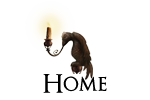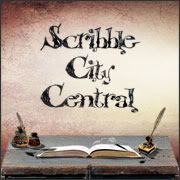SCC's tenth Fantabulous Friday comes from Jonathan Stroud, award-winning fantasy master extraordinaire. I've admired Jonathan's work for ages - in particular his Bartimaeus books, which I've given to countless kids as birthday and Christmas presents. All have enjoyed them and demanded more. These are definitely books on my keep and re-read pile, not least because they are both clever and funny.
The thing I love most about Bartimaeus is that although he talks the djinni talk (bigtime), and is full of sarcasm, swagger and bravado, he's really quite human in his flaws. His relationships with Nathaniel and Kitty make me both laugh and wince with recognition, and the scope of Jonathan's imagination (and what he does with it in writing these books) is both marvellous and amazing in the right sense of the words. I can therefore think of no one better than Jonathan to enlighten us all on the mystery which is:
D for Djinni
Mischief and Mayhem Specialist
JS: For me, it’s all in the spelling.
Genie or Djinni? When you think of a powerful magical creature issuing forth from some restrictive prison (a lamp, say), and billowing up smokily into a vast and potent form, do you go for a soft initial ‘g’ or that harder, slightly more cussed, ‘dj’? The answer to that question influences whether you end up with something sporting earrings, ringlets, curled slippers and overly oiled biceps, or something altogether stranger, harsher and more dangerous. Which is not to say you can’t still give it a few jokes.
Funnily enough, even though Bartimaeus the Djinni has been central to my writing for almost ten years now, historically I’d never been a big fan of genies. The one in the great Alexander Korda movie Thief of Baghdad was, admittedly, pretty impressive, but most traditional examples were too tasselly for my taste. They were pantomime figures with stock powers and responses, thoroughly engrained in popular culture. Rubbed Lamps? Check. Three Wishes? Check. Even Robin Williams’ virtuoso turn in Aladdin scored highly on the Cheese-o-meter. Good gags, yes, but not much gravitas, and thoroughly Western in its range of references. All in all, it wasn’t a tradition that much interested me.
And yet. There was an older, deeper tradition out there, of which I was dimly aware, from which all the modern clichés stemmed. It was that of the Thousand and One Nights, of course, the great storehouse of Arabic story, and the djinn (or jinn) which it contained were a good deal more formidable than their emasculated descendants. They were vast, smoking giants, often inimical to mankind, creatures of air and fire who formed a separate race somewhere between mortals and the gods. They could move mountains and cover vast distances in the blink of an eye. In short, you Did Not Mess with them. They’re pre-Islamic in origin, but they appear in the Koran too, among the massed servants of King Solomon. In Richard Burton’s English translation of Thousand and One Nights, these ‘jinn’ remain ferocious and terrible. You still see glimpses of their power in Kipling’s ‘The Butterfly Who Stamped’, the last tale in the Just So Stories. Korda’s movie holds true to their nature, too, and this gives his genie its potency.
Anyway. In 2001 I wrote the first scribbled notes for a new book. It would feature ‘a demon or sprite who, along with all his kind, is summoned by wizard’s magic to perform tasks [and] obey – essentially a slave’. He was going to be the narrator too, and it would be his perspective, rather than that of the magicians, that we were going to identify with. I conceived him originally as a ‘demon’, but I quickly realised that, in his regular bondage to human masters, in his interesting mix of power and vulnerability, he was most definitely a genie of some kind. Or rather, he wasn’t going to be a ‘genie’, because I disliked the connotations. But a jinni, or djinni, in the earlier form of the word? Yes, that he definitely could be.
Right from the beginning, when Bartimaeus turns up in the bedroom of the 12-year-old Nathaniel in (a roughly) contemporary London, I was wresting my djinni away from its Arabic origins. His name, for instance, is Biblical. He is still a being of ‘fire and air’, capable of changing size and shape at the drop of a hat, but his repertoire of Detonations, Infernos, Spasms and other attacks has more to do with the spells of modern fantasy than anything historical. He is summoned via a pentacle, as Renaissance magicians summoned demons and devils in European tradition. He name-checks Baghdad, but also a much older past, spanning continents and cultures. One of his bynames is Sakhr-al Jinni (the moniker of a naughty djinni who in legend stole King Solomon’s magic ring), but he’s also got a dozen others. He’s been Bartimaeus of Uruk, in the time of Gilgamesh; N’gorso the Mighty in medieval Africa; Rekhyt in Ancient Egypt, and so on. The one constant is he’s been an almighty pain in the neck to magicians across all human history. My approach throughout was to fuse actual folklore (and literary and historical traditions) with the made-up stuff: the result would be to create something sinewy and believable, and recognisably my own.
An example of this is my hierarchy of spirits. Doing a little research into the original Arabic djinn, I discovered there were (and are) believed to be five main orders: Marids (the most powerful), Afrits (or Efrit/Ifrits), the Shaitan, the Jinn and the Jann. I liked putting Bart into a firm hierarchy, but I adapted it to my own design. Marids I kept, and Afrits, but Shaitan had to go for fairly obvious etymological reasons; Jinn was okay, but Jann was too similar, so I binned that as well. My 5 levels became: Marids, Afrits, Djinn, Foliots (a word I thought I made up; annoyingly, it also turns out to be a technical term for a portion of a clock) and Imps. These last are very much in the European tradition of small, ugly, goblinish creatures, and have very little to do with anything Arabic at all. In terms of power, Bart is very much in the middle of the hierarchy (despite his boasts to the contrary); whenever he’s not bullying the rubbish foliots and imps, he’s having to grudgingly kow-tow to the swaggering afrits he comes across. This isn’t the only way in which Bart’s mythic world echoes the structures and restrictions of our mundane human one.
Almost from the first sentence, I realised Bartimaeus was an ideal protagonist for me: I loved his insolence, his energy, his self-awareness, his ability to undercut many of the pomposities of fantasy with a well-timed footnote. I suppose by the end he may have drifted fairly far from his classical Arabic antecedents, but in his essential characteristics – his mercurial shape-shifting, his ambivalent approach to humans, and (above all, perhaps) the constant restrictions placed upon his supernatural powers – he remains very much a paid-up, card-carrying member of that hard-working class of magical entities, the noble djinn.
SCC: I LOVE the fact that foliot is really a bit of clock - are there any words left for us authors to 'make up'? What a great insight, not only into the origins of Djinni themselves, but also into the origins of Bartimaeus himself. Thank you so much for visiting, Jonathan.
Next week: D for Doppelganger with the marvellous Marcus Sedgwick (or will it be his evil look-alike?!) - there'll be one of his books to win, so be sure and visit again on Fantabulous Friday.
PS: I'm also on An Awfully Big Blog Adventure today, talking about how ignorance of Greek myths can lead to censorship and arrest. Just click on the link above to see what it's all about.




















8 comments:
Oooh he does sound fun - don't know him but want to find out more about him!
He's well worth it, Cat! And his snarky footnotes are priceless.
Lovely to see the excellent Jonathan here, Lucy. I love those footnotes too!
Thanks, Adele - I'm delighted Jonathan is here too. I just wish people would comment more - SCC has had nearly 600 visitors to this particular post in one morning - maybe everyone is too shy!
What a perfect blend of myth, magic, and history Bartimaeus is. Jonathan is a gem of a writer, as always.
Bartimaeus is one of my favorite characters ever! Many thanks to JS for stopping by to give us a glimpse of how he came to be. I sincerely hope to see Bart again in future books. In the meantime, perhaps it's time for a re-read ...
One of my favorite series. I'm actually doing my IB Extended Essay on The Ring of Solomon.
Bartemius is indeed one of the great characters of fantasy (imo) and the footnotes were a touch of genius and one of my favourite things of the series. They give a real insight into the thoughts of the character.
Post a Comment